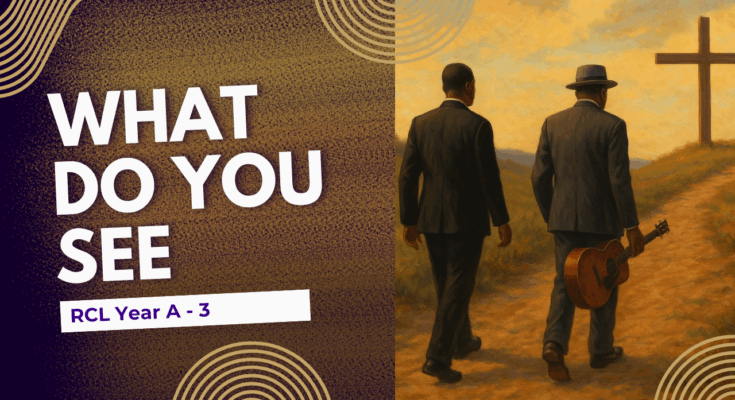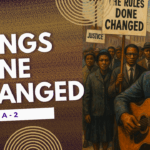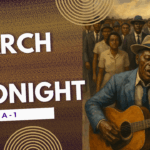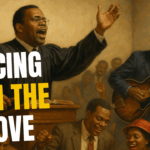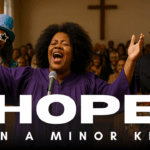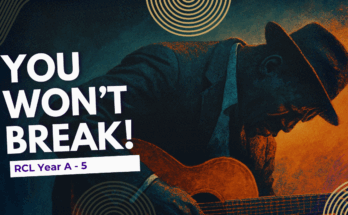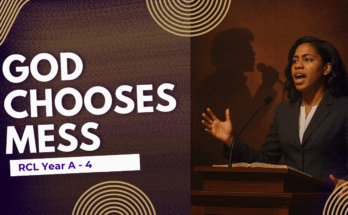As an Amazon Associate I earn from qualifying purchases.
Introduction
Have you ever wondered why the great God of the universe — the God who spoke and stars were born (Psalm 33:6), the God who split the sea with a blast of His breath (Exodus 15:8), the God who can do all things (Jeremiah 32:17) — decided not to do something for you?
You prayed with faith. You fasted. You believed. And yet the sickness lingered. The job never came. The door stayed closed.
- A mother prays over her child in the hospital room, watching the machines beep and wondering if heaven hears her.
- A man who gave decades to his company packs his desk into a cardboard box, laid off the year before retirement.
- A student prays for strength, but the loans pile higher than the paycheck.
- A believer kneels every morning for family salvation, but every night another child drifts farther away.
Have you ever sat in church singing “He’s able” — but deep inside you whispered, “But will He? For me?”
Now don’t play holy with me. Don’t act like you ain’t never thought it. I know what the slogan says — “God is good all the time, and all the time God is good.” But sometimes you sit there thinking, “Lord, what You talking ’bout? Where You at? God ain’t told me nothing yet.” Ain’t nobody said you had to fake it.
That’s not an unbeliever’s question. That’s not the cynic’s question. That is the believer’s question. Because sometimes faith doesn’t hide the question — sometimes faith summons the question.
And that’s where John the Baptist is.
This is John — the prophet in camel’s hair (Matthew 3:4), the voice crying in the wilderness, “Repent, for the kingdom of heaven is at hand” (Matthew 3:2). The same John who baptized Jesus, saw the heavens open, and heard the voice of God declare, “This is my beloved Son, with whom I am well pleased” (Matthew 3:17).
But now — that same John sits in Herod’s prison (Matthew 11:2; 14:3–4). The wilderness prophet is silenced by stone walls. The baptizer who stood in the river now stands in chains. And from that cell comes the cry:
“Are You the One who is to come, or should we look for another?” (Matthew 11:3).
I. John’s View: Bars and Chains (Matthew 11:2–3)
All John can see are walls. Iron bars. Shackles. Darkness. Death on the horizon.
That’s the blues reality: even prophets end up in prison. Even the faithful end up in dark places.
- Noah built the ark but ended up drunk in a tent (Genesis 9:21).
- Elijah called down fire but hid in a cave begging to die (1 Kings 19:4).
- Job prayed every day for his children but still buried them (Job 1:18–20).
- Jeremiah spoke truth and was lowered into a muddy cistern (Jeremiah 38:6).
- Paul cast out demons in Philippi and ended up locked in the stocks (Acts 16:23–24).
And now John — faithful John — ends up in Herod’s dungeon.
That’s not just John’s story. That’s ours.
- You can raise your children right and still watch them wander.
- You can tithe faithfully and still face eviction.
- You can love deeply and still get left.
- You can serve the church and still find yourself lying in a hospital bed alone.
- You can sing in the choir on Sunday and sit with divorce papers on Monday.
- You can preach with fire and then wrestle with depression in the quiet hours.
- You can smile in public and still cry yourself to sleep at night.
C’mon now — somebody knows life don’t always pay you back fair. Ain’t nobody told you faith was a magic trick. Ain’t nobody said you wouldn’t cry.
John’s cell is our mirror. His cry is our cry.
The psalmist asked the same thing: “How long, O Lord? Will you forget me forever? How long will you hide your face from me?” (Psalm 13:1). That’s the sound of a believer in prison.
“Sometimes I feel like a motherless child, a long way from home.”
“Nobody knows the trouble I’ve seen, nobody knows but Jesus.”
“I’m crying for my baby, but she sure don’t hear my call.”
That’s the truth of the blues — absence, distance, unanswered prayers. And again I say: this ain’t the atheist’s question. This is the believer’s question. Because sometimes faith summons the question: “Are You the One?”
II. Jesus’ Response: What Do You See? (Matthew 11:4–5)
John can only see prison. But Jesus points to evidence.
“Go and tell John what you hear and see: the blind receive their sight, the lame walk, the lepers are cleansed, the deaf hear, the dead are raised, and the poor have good news brought to them.”
Notice: Jesus doesn’t promise John freedom. He don’t say, “I’ma bust you out next week.” He don’t say, “Just hold on a little while longer, I’m coming with the key.”
No — He says, “Go tell John what you see and hear.” Ain’t that something? John says, “Are you the One?” and Jesus says, “Look around.”
- Isaiah said: “Then the eyes of the blind shall be opened, the ears of the deaf unstopped; the lame shall leap like a deer” (Isaiah 35:5–6).
- Isaiah said: “The Spirit of the Lord is upon me… to bring good news to the poor” (Isaiah 61:1).
- Isaiah said: “I will give you as a covenant for the people, a light for the nations, to open the eyes that are blind, to bring out prisoners from the dungeon” (Isaiah 42:6–7).
- Jesus says: it’s happening. Right now.
John sees walls. But the disciples see miracles. John sees death ahead. But Jesus points to resurrection around. John sees despair. But Jesus points to the kingdom alive.
The answer to John’s blues is not escape — it’s evidence.
And maybe that’s God’s answer to you. You may not be free yet, but somewhere chains just broke. You may not be healed yet, but somewhere a blind man just opened his eyes. You may not feel joy yet, but somewhere a poor soul just heard good news.
- You may not see your breakthrough, but somebody in this church just got theirs.
- You may still be waiting on an answer, but somebody else is standing on their testimony.
- You may feel the sting of delay, but the kingdom has not stopped moving.
III. The Hard Blessing (Matthew 11:6)
Then Jesus says: “Blessed is anyone who takes no offense at me.”
That’s the hard blessing. Because the gospel is offensive when it doesn’t line up with my expectations.
- God can heal somebody else’s body while I’m still sick.
- God can raise someone else’s child while mine is still gone.
- God can open someone else’s door while mine stays shut.
That’s when faith feels like walking blind. That’s when belief feels like carrying weight.
I remember a sister who shouted when her friend was healed, but when she got home she wept because her own body was still wracked with pain. That’s the offense of the gospel: God is good — but not always in the way I wanted, when I wanted, how I wanted.
And yet Jesus says: blessed is the one who don’t stumble there. Blessed is the one who can still sing even through tears. Blessed is the one who can pray through clenched teeth. Blessed is the one who holds to faith when faith hurts.
That’s hard, church. That’s like saying: “Yeah, it hurts… but don’t trip.” What you talking ’bout, Jesus? You mean to tell me I gotta watch somebody else get their blessing while I’m still waiting? Yeah. That’s the offense. And yet — blessed is the one who don’t quit.
The prophet Habakkuk knew this. He cried out: “Though the fig tree does not blossom, nor fruit be on the vines, the produce of the olive fail… yet I will rejoice in the Lord” (Habakkuk 3:17–18). That’s blues faith — no fruit, no harvest, no visible evidence, but still a song of trust.
The blues says it plain: “I can’t keep from crying sometimes.” But faith says: “I’m crying, but I’m still holding.”
IV. Lament Doesn’t Cancel Your Call (Matthew 11:7–11) — Expanded
When John’s disciples walk away, Jesus turns to the crowd. And what does He do? He doesn’t scold John. He doesn’t shame him. He doesn’t say, “Well, I guess John lost his faith.”
No. Jesus honors him. “What did you go out into the wilderness to look at? A reed shaken by the wind? … A prophet? Yes, I tell you, and more than a prophet.”
I love this — because it means God ain’t done with you just because you doubt. Anybody ever been there?
Like Thomas in the upper room (John 20:25), you didn’t say it wasn’t true — you just said, “I gotta put my finger in the side. I gotta see for myself.” That’s not rejection — that’s wrestling. That’s not disbelief — that’s faith in a minor key.
And let me be real with you: I know it ain’t pious to say, but how many folks know they don’t always feel like saying, “God is good all the time, and all the time God is good”? Y’all know what I’m talking about. How many folks sometimes wonder, “Lord, what are You doing?”
You sitting in your prison — the prison of sickness, the prison of grief, the prison of debt, the prison of depression — and you want God to show up for you. Somebody knows what I’m talking about. I know your religiosity won’t allow you to say it out loud, but sometimes late at night, when the lights are out and no one is listening, you cry out and ask: “God, what are You doing? Where are You?”
And here’s the shout: the good news is that God ain’t done with you when you pray that prayer. The good news is that when they say, “Take your burdens to the Lord and leave them there,” that includes your wondering. That includes your doubt. That includes your cry in the night: “Lord, where are You?”
Don’t let anybody tell you that questioning God means you’ve lost Him. Don’t let church folk shame you into silence. Because if lament disqualified you, the Bible would be half as long. Go read the Psalms. David cried, “My God, my God, why have you forsaken me?” (Psalm 22:1). Jeremiah said, “You deceived me, Lord, and I was deceived” (Jeremiah 20:7). Job said, “Let the day perish on which I was born” (Job 3:3). And yet every one of them is remembered as faithful.
John doubted, but Jesus still celebrated him. John questioned, but Jesus still called him a prophet. The momentary loss didn’t negate his faith. The question didn’t cancel his calling. His lament didn’t erase his legacy.
And the same is true for you. You might cry yourself to sleep, but heaven still calls you child. You might wonder if your prayer even reached the ceiling, but Jesus still celebrates your faithfulness. You might doubt in the night, but the Lord still declares your name in the light.
I love that. I love that. Because if Jesus can celebrate John, then He can celebrate me. If John’s lament didn’t erase his legacy, then my lament won’t erase mine.
So cry if you must, but don’t quit. Question if you must, but don’t walk away. Wonder if you must, but don’t let go. Because the gospel truth is this: your lament does not cancel your call.
That’s blues theology: the moan belongs to the music, the lament belongs to the liturgy, the question belongs to the faith.
V. The Kingdom Is Alive (Matthew 11:5) — Expanded
Now here’s the rise. Jesus says: John, you see a prison. But the kingdom is alive.
Yes, you’re in this cell — but somewhere a blind man is opening his eyes.
Yes, you’re hurting — but somewhere a lame woman is leaping like a deer.
Yes, you’ve got tears — but somewhere the poor are hearing good news.
The kingdom doesn’t die just because I’m struggling. The kingdom doesn’t stall just because I’m in chains. The kingdom doesn’t stop just because I can’t see it.
That’s the tension of the blues: my verse is minor, but the chorus is still moving. My song is heavy, but the groove is alive.
Can I testify?
- Joseph sat in prison, but the kingdom was alive in Pharaoh’s dreams.
- Israel sat in Babylon, but the kingdom was alive in Ezekiel’s vision of dry bones.
- The disciples sat in fear after the crucifixion, but the kingdom was alive when Jesus walked out of the tomb.
And the kingdom is still alive right now.
- It’s alive in the testimony of the healed.
- It’s alive in the laughter of children who eat because a church fed them.
- It’s alive in your neighbor’s breakthrough, in your sister’s blessing, in your brother’s recovery.
- And it’s alive in the ministries in this very church — some I don’t even know about. Somebody’s feeding, somebody’s teaching, somebody’s visiting, somebody’s praying. The kingdom is alive, y’all!
And it’s alive beyond these walls too. It’s alive in small congregations preaching hope to empty pews. It’s alive in believers meeting in secret where Christianity is outlawed. It’s alive in young people praying on campuses. It’s alive in old saints whispering hymns in hospital rooms.
Yes… the kingdom is still there.
Yes… God is still about His business.
Yes… the Spirit is still moving.
Yes… the gospel is still good news.
Yes… the work is still going forward.
Yes… the kingdom is still alive!
Don’t let the devil tell you different. Don’t let your eyes trick you. Don’t let your pain lie to you. ’Cause ain’t nobody said the kingdom was dead. It’s alive, y’all. Still alive.
And one day, Revelation says, that kingdom will come in full: “Behold, the dwelling place of God is with man. He will dwell with them, and they will be His people, and God Himself will be with them as their God. He will wipe away every tear from their eyes, and death shall be no more” (Revelation 21:3–4).
So hold on — because yes, it’s hard right now, but the kingdom is still alive. Yes, you may be hurting, but the kingdom is still alive. Yes, you may be waiting, but the kingdom is still alive.
The evidence is in. The kingdom is alive. And it will not die.
VI. The Closing Rise – The Refrain
And so I ask you, church: What do you see?
Do you see only the bars — or do you see the kingdom?
Do you see only the hurt — or do you see the healing?
Do you see only the sorrow — or do you see the Savior?
Because Jesus is still at work. The evidence is still speaking. The kingdom is alive.
And when you see it, you can call His Name. You can ride the refrain:
- Who healed the sick? — Jesus
- Who raised the dead? — Jesus
- Who brings good news to the poor? — Jesus
- Who walks with me in the valley? — Jesus
- Who wipes away my tears? — Jesus
- Who is the One? — Jesus
- Who still reigns when I’m in the dark? — Jesus
- Who ain’t never lied to me yet? — Jesus
Let it ride till the roof shakes. Let it ride till somebody in the back can’t hold it no more. Let it ride till the chains rattle, till the doubts bow, till every heart knows:
Jesus is the One.
Amazon and the Amazon logo are trademarks of Amazon.com, Inc, or its affiliates.

